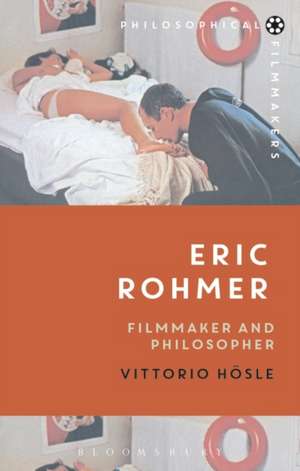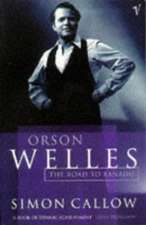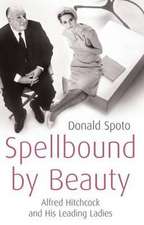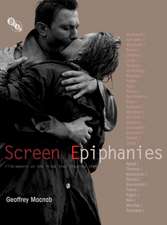Eric Rohmer: Filmmaker and Philosopher: Philosophical Filmmakers
Autor Professor Vittorio Hösleen Limba Engleză Paperback – 27 iul 2016
| Toate formatele și edițiile | Preț | Express |
|---|---|---|
| Paperback (1) | 160.87 lei 6-8 săpt. | +30.06 lei 6-12 zile |
| Bloomsbury Publishing – 27 iul 2016 | 160.87 lei 6-8 săpt. | +30.06 lei 6-12 zile |
| Hardback (1) | 713.29 lei 6-8 săpt. | |
| Bloomsbury Publishing – 27 iul 2016 | 713.29 lei 6-8 săpt. |
Preț: 160.87 lei
Preț vechi: 174.12 lei
-8% Nou
Puncte Express: 241
Preț estimativ în valută:
30.78€ • 32.14$ • 25.48£
30.78€ • 32.14$ • 25.48£
Carte tipărită la comandă
Livrare economică 04-18 aprilie
Livrare express 27 februarie-05 martie pentru 40.05 lei
Preluare comenzi: 021 569.72.76
Specificații
ISBN-13: 9781474221122
ISBN-10: 1474221122
Pagini: 216
Dimensiuni: 138 x 216 x 15 mm
Greutate: 0.41 kg
Editura: Bloomsbury Publishing
Colecția Bloomsbury Academic
Seria Philosophical Filmmakers
Locul publicării:London, United Kingdom
ISBN-10: 1474221122
Pagini: 216
Dimensiuni: 138 x 216 x 15 mm
Greutate: 0.41 kg
Editura: Bloomsbury Publishing
Colecția Bloomsbury Academic
Seria Philosophical Filmmakers
Locul publicării:London, United Kingdom
Caracteristici
Treats the filmmaker Eric Rohmer and his cinematic works from philosophical perspective, uncovering themes crucial to an nuanced reading of the films-as-philosophy.
Notă biografică
Vittorio Hösle is the Paul Kimball Professor of Arts and Letters in the departments of German, Philosophy, and Political Science at the University of Notre Dame, where he directed the Notre Dame Institute for Advanced Study from 2008 to 2013, and an Ordinary Member of the Pontifical Academy of Social Sciences.
Cuprins
Preface1. Rohmer and the Description of Contemporary Eroticism2. From Dialogue to Film3. Les Contes des Quatre Saisons as a Coherent Universe4. The Implied Morals5. ConclusionBibliographyIndex
Recenzii
Hösle offers a valuable contribution to Anglophone Rohmer scholarship, bringing his philosophical background to the thorny topic of religion and film. For readers interested in a Christian interpretation of Rohmer's films, I can warmly recommend this book; Hösle's over-arching thesis about the religious basis of Rohmer's films is supported by concise readings of individual films in Rohmer's oeuvre, all of which illustrate with sensitivity and insight the religious implications of Rohmer's comic morality tales.
In this through and detailed account of Eric Rohmer's three great film cycles, The Moral Tales, Comedies and Proverbs, and The Tales of the Four Seasons, Vittorio Hösle demonstrates how Rohmer undertook one of the great studies of modern erotic life in his cinematic depictions of love relations between men and women. Understanding Rohmer as both a Catholic filmmaker and as well versed in the Germanic philosophical tradition, Hösle shows us how his acutely realist films, always based in a recognizable time and place, nevertheless offer a view of the metaphysical, spiritual and transcendent possibilities that may lie behind our romantic and amorous entanglements. This engaging book encourages us to return to Rohmer's films with a vivid understanding of both their suggestive religious and philosophical resonances and their sympathy with the complexities of the human condition.
In this through and detailed account of Eric Rohmer's three great film cycles, The Moral Tales, Comedies and Proverbs, and The Tales of the Four Seasons, Vittorio Hösle demonstrates how Rohmer undertook one of the great studies of modern erotic life in his cinematic depictions of love relations between men and women. Understanding Rohmer as both a Catholic filmmaker and as well versed in the Germanic philosophical tradition, Hösle shows us how his acutely realist films, always based in a recognizable time and place, nevertheless offer a view of the metaphysical, spiritual and transcendent possibilities that may lie behind our romantic and amorous entanglements. This engaging book encourages us to return to Rohmer's films with a vivid understanding of both their suggestive religious and philosophical resonances and their sympathy with the complexities of the human condition.























